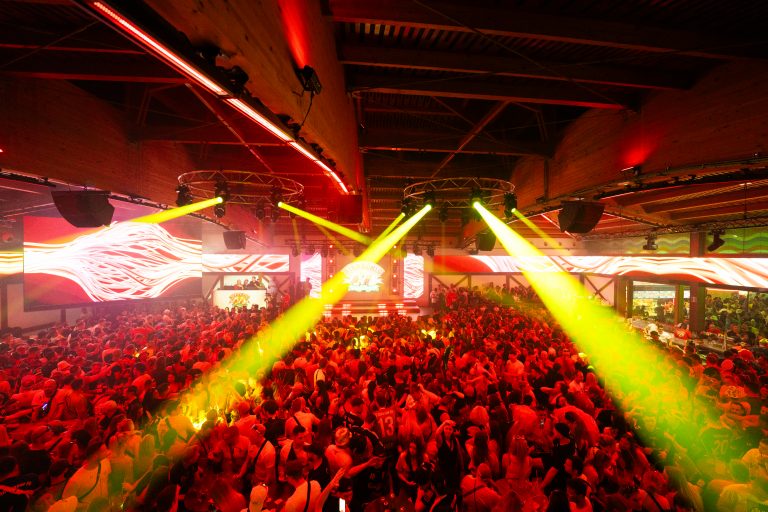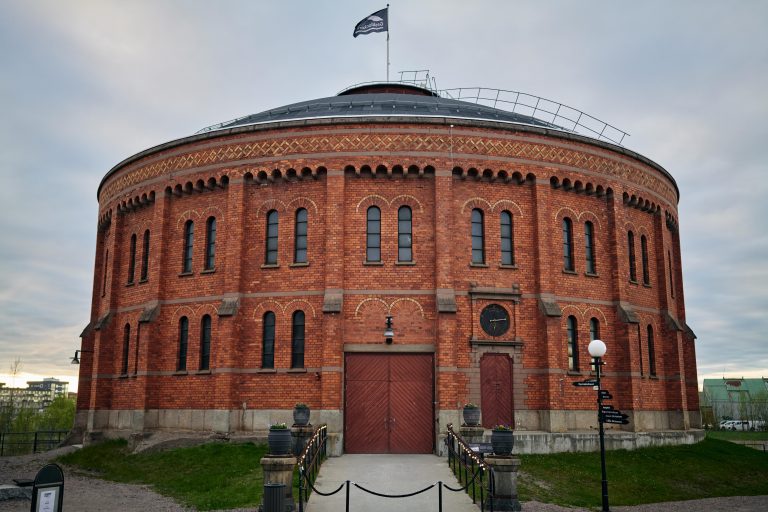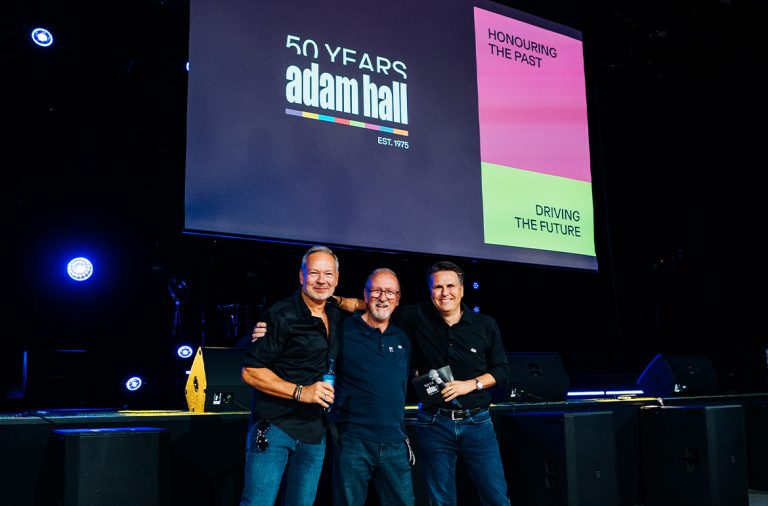German Diversity Day 2023: Hussam Albakkar’s inspiring story of hope, inclusion and success at Adam Hall Group
The moving story of Hussam Albakkar is a good example of how integration through workplace can succeed. We interviewed him as part of our activities for German Diversity Day, which the Charta der Vielfalt calls for every year on 23 May, in order to shed more light on the diversity dimension of ethnic origin/nationality as a representative of the topic of diversity. At the same time, Hussam’s story shows that openness to differences and the promotion of individuality – no matter what dimension – contributes to the economic and social sustainability of our company.
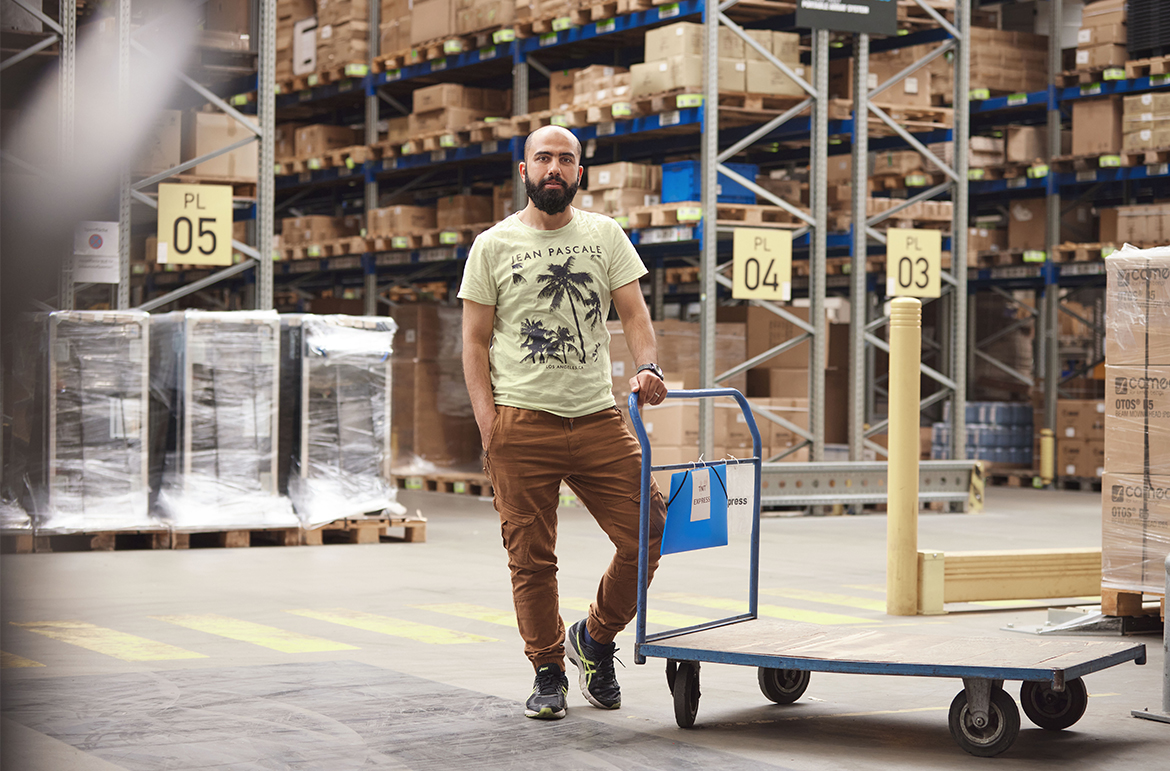
Diversity – What it’s all about?
Before we introduce Hussam, we would like to say a few words about diversity in general, but also in the event industry. Diversity involves much more than differences in gender, nationality or origin. Diversity has multi-layered dimensions, all of which are equally important for a person’s personality and for our society.
The core dimensions (the inner circle) can hardly be changed, or only to a limited extent, and are protected by national and international equal treatment provisions. The middle level (middle circle) shows the characteristics of a person that he or she gradually acquires in the course of life – which are therefore largely changeable. The organisational level (outer circle) contains the factors that are added in the context of the world of work and which a person can acquire within an organisation.
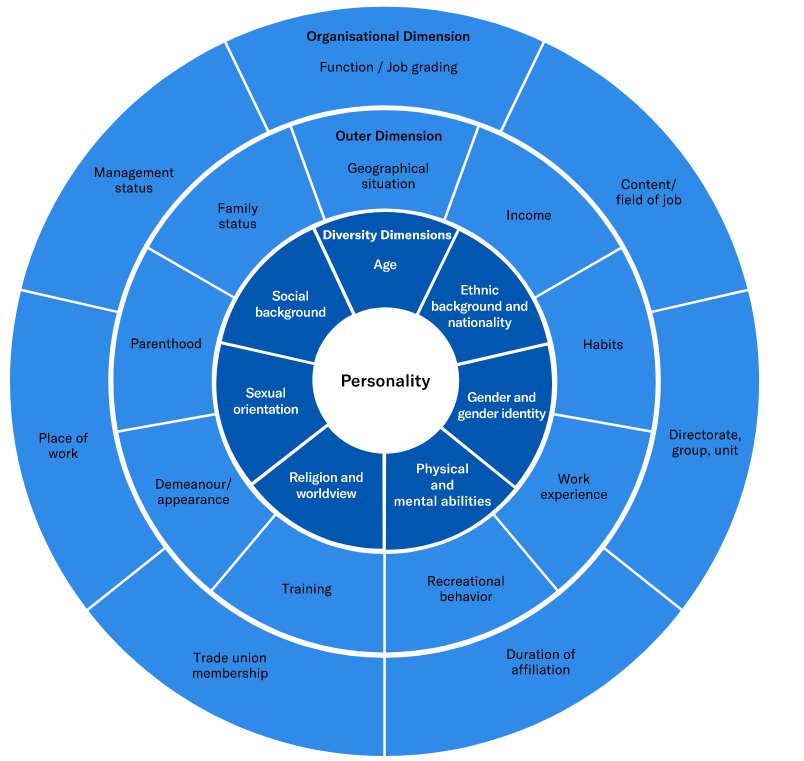
Ethnic background/ nationality as a diversity dimension
The dimension “ethnic background and nationality” is about, among other things, origin from different nations and the associated cultural, social and historical heritage. The cultural differences that exist as a result are seen as an enrichment for every society, every culture and every team in the sense of diversity. As an internationally active company, the Adam Hall Group benefits from the different language and cultural skills of our colleagues. These give us a better understanding of, for example, the different regions of the world and the values and norms recognised there. Unfortunately, there are still too many cases where people are racially insulted or experience structural discrimination because of their ethnic background or nationality. This includes discrimination based on the colour of their skin or not being considered for a job because of their surname.
Open to uniqueness – Come as you are!
At Adam Hall Group, we believe that diversity at a personal and organisational level is one of the most important keys to unlocking creativity and fostering innovation. We also believe that the openness to the uniqueness of each and every individual, which we live every day, is instrumental in shaping the Adam Hall Group Spirit. We firmly believe that it is not individual aspects that determine who a person really is. What counts is the essence of everything that makes us special and unique as individuals and as personalities.
“Diversity is not about how we differ. Diversity is about embracing one another’s uniqueness.”
Ola Joseph
Based on this conviction, we signed the Charta der Vielfalt in 2022. The aim of the Charta der Vielfalt is to create an appreciative working environment for all employees – regardless of age, ethnic background and nationality, gender and gender identity, physical and mental abilities, religion and world view, sexual orientation and social background. In the meantime, more than 4,900 companies are members or signatories.
The event industry is also unique. The event industry thrives on diversity – because it is not only the different trades that make us what we are, but also the different people with their individual stories. It is this wonderful mixture – the input and the individual skills of each person – that creates extraordinary cultural experiences.
And while we are on the subject of each individual’s contribution and individual abilities and special cultural experiences, we would now like to introduce you to a special story by our colleague Hussam Albakkar.
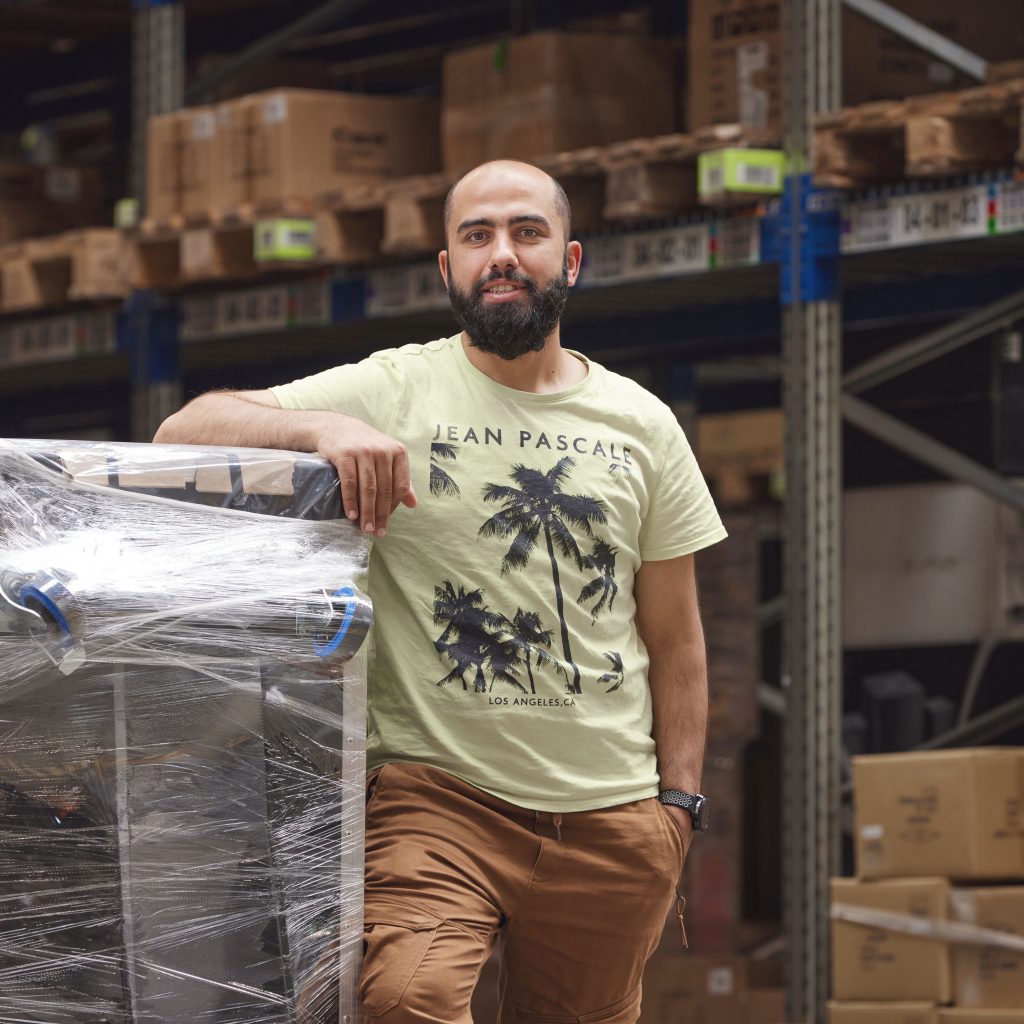
Hussam, please introduce yourself: Where are you from, how old are you and when did you come to Germany?
I am Hussam Albakkar, 31 years old, married and have 2 boys. I come from Syria / Aleppo and arrived in Germany in June 2015, almost exactly eight years ago. I have been working for the Adam Hall Group since 1 June 2016.
What was your path to Germany like?
To be honest: It was terrible and dangerous. I fled Syria on foot to Turkey in January 2014. In September 2014, I travelled to Greece in a rubber boat in a crossing that took about 6 hours. To get to Germany, I continued on foot to Macedonia in September 2014. Several attempts were necessary and it took about 3 days each time. In the capital of Macedonia (Skopje), I was stopped by the police with a group because we were travelling illegally in a taxi. The driver ran away and I was held as a witness in the refugee home for 7 months. It felt like prison, because you weren’t allowed out.
After 7 months I was finally released. It was a fantastic feeling to be free! Then I stayed in Skopje for about a week and then took a bus towards Serbia. Shortly before the border I had to get off because I was not allowed to enter. I then walked 4-5 hours through the forest to Serbia with two other people I met on the way. Once there, I stayed in Belgrade for eight days and continued by bus towards Hungary. To cross the border into Hungary and at the same time into the EU, I had to walk for a very long time again. I was on foot for about 13 hours until I reached Hungary. I didn’t feel very comfortable in Hungary, so I left the same day with a taxi and other people in the direction of Vienna. In Vienna I met up with a buddy. There I could finally sleep and rest.
Compared to the other legs, the journey from Vienna to Germany was a real luxury trip. And as luck would have it, I arrived in Germany in mid-June 2015, exactly on my birthday.
How would you describe your experience of finding your feet in Germany as a person with a refugee background?
It was very difficult at the beginning. Everything was new – the language, the habits, even the weather… Thanks to the football club FC Neu-Anspach, it was easier for me to arrive. I learned a lot from the boys and understood many things better. For example, how to settle in here and very importantly, I got to know the Adam Hall Group through the club. I found security after about 4 years. For me, it means no war and waking up to the sound of birds instead of the hum of planes.
How did inclusion work in your case? What was good, what could have gone better?
Inclusion has worked very well for me. I worked as a temp in VAS (Value Added Service) at Adam Hall Group from 2016 – 2018 and I took a German course at the same time. What I learned about the language at school, I could immediately put into practice at work. During this time I was also active in the football club. Thanks to my work colleagues, the football members and my landlady at the time, it didn’t take long to speak German and understand the others.
After 2 years of experience at Adam Hall Group, I applied for an apprenticeship as an electronics technician for devices and systems in 2018. Unfortunately, as my application was too late, I could not start an apprenticeship this year. Therefore, I got a year-long employment contract as a department head representative VAS to bridge the time until the next training year starts. During the time I was working full-time, I changed my mind again and wanted to do an apprenticeship as a merchant in wholesale and foreign trade. My training started on 01.08.2018 and on 28.06.2022 I officially passed my exam to become a merchant in wholesale and foreign trade.
Looking back, the first 3-4 months were very difficult for me and I briefly thought that I might not be able to complete this training. Nevertheless, I kept going, didn’t give up and completed my training with a good grade.
I only managed to do that because despite the daily bad memories and negative thoughts, I used the time and didn’t give up. It couldn’t have gone better. I have to be honest: I definitely have goals, but I think I’m at your great level. As I said, I keep going and want to develop further.
What are the biggest differences between Syrian and German culture? What did you have to get used to, what did you find easy?
The first thing I would mention is the food. I come from a city that is known for delicious food. Mothers spend between 3-5 hours in the kitchen preparing lunch for the family. In comparison, there is such an elaborate preparation of food when you have a big party here. In my home country, this is commonplace.
Second is the issue of religion. In Syria, Islam is the religion that about 90% believe in. Of course, there are other religions in this country, but the majority is Muslim. I had nothing to do with people who belong to another faith in Syria. That’s why it took me a long time here in Germany to come to terms with the fact that people here believe in other and sometimes different religions.
What do you think about the topic of diversity (especially in relation to ethnic background, nationality and social background)?
Of course, every nationality has different cultures and habits, but through social media you can know about everything nowadays. The world has become like a village.
What do you think: How can companies help create an inclusive work environment?
Give more chances to applicants, even if people don’t know German. I can remember my job interview in 2016. I barely introduced myself in German and the rest was weak English. If Adam Hall had rejected my application then, I don’t know where I would be now.
Do you think that actions like Diversity Day help to raise awareness and contribute to a better integration of people from all backgrounds into society?
Yes, I think so. I would say that most Germans (because I live in Germany at the moment) are reluctant when it comes to meeting new people. It could be because they’ve had bad experiences. But that’s why I find such occasions very important, so that you can get to know and better understand other cultures and habits and thus indirectly other people.
Thank you very much, Hussam, for taking the time to answer our questions about yourself and your story.
Hussam’s story is representative of the sometimes traumatic experiences that many refugees have had to go through and that refugees currently have to go through. In the same way, it is only emblematic of one of the many dimensions of diversity and reflects only a part of what falls under the dimension of ethnic background and nationality. But it is also a positive example of how important it is for good coexistence to recognise and respect differences, to be open to new things, to create opportunities for understanding and integration, and to support and enable each and everyone individually to achieve their personal goals.
We are proud that Hussam has been part of the Adam Hall Group since 2016 and has found his permanent place in our Logistics & Shipping department.
At the same time, we would like to point out once again in this context that the aspects addressed here only illuminate a small section of the diversity dimension “ethnic baclground and nationality” and the entire topic area of diversity. Our aim with this contribution is to pay a little more attention to this topic and to make it more tangible for interested parties by means of an example.
#AdamHallGroup #Diversity #Sustainability #DiversityDay2023
More information:
adamhall.com/working-for-adam-hall-group


